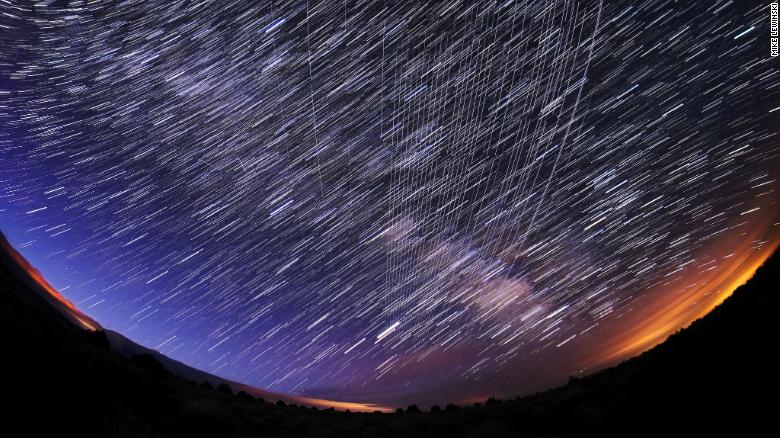SpaceX could lose more than 40 of its satellites.
This is the reason 1:13
Saskatchewan, Canada (CNN) —
The night sky has been a source of information and wonder since the dawn of mankind, and it looks much the same now as it did then.
But the night sky as we know it is about to change dramatically due to the proliferation of satellites just a few hundred kilometers above Earth.
"For the first time in human history, we're not going to have access to the night sky the way we've seen it," said Samantha Lawler, an assistant professor of astronomy at the University of Regina in Canada.
Lawler has been watching from his farm in Saskatchewan, Canada, as the number of active satellites has multiplied from around a thousand in 2017 to more than 5,000 today.
When CNN visited him on a clear March night, he only took a few minutes looking up to see the first of many satellites streaking across the sky, with the naked eye.
In the photo, the overpass of the Starlink satellite, taken in Piedras, New Mexico, on March 22, 2020.
"This is much worse than I expected," Lawler told CNN.
"It's changing rapidly."
And it's about to get a lot worse.
Lawler and two other Canadian astronomers published a paper in December in The Astronomical Journal predicting that, in less than a decade, 1 in 15 points of light in the night sky will be a moving satellite.
advertising
"Think about it," Lawler said.
"There are only about 4,000 stars that you can see with the naked eye and if 200 of them are moving, that's very different from the sky we're used to."
Satellites are even more disruptive when you're looking through a telescope, and they're already contaminating images of the cosmos captured by observatories around the world.
Unless something drastically changes in terms of international regulations on the number of satellites, reflectivity and transmission, experts like Lawler believe the impact on astronomical research will only become more intense.
"It's like we're going through this transition (similar to) when the first cars were on the roads. A Model T would drive down the road and you'd run out and see it," Lawler said.
"But now you live next to a giant freeway, full of cars. That's kind of a transition that we're going through with satellites in the night sky right now."
The positive side of megaconstellations
It's the dawn of the mega-constellations, tens of thousands of tiny satellites just 300 miles (483 kilometers) above Earth, launched by private companies to provide global high-speed Internet access.
Elon Musk's SpaceX is responsible for about a third of all active satellites in orbit, more than any other company or country, including the US government.
SpaceX has already launched more than 2,000 satellites with plans to launch at least 42,000 more for its mega-constellation called Starlink.
Other distant competitors include Amazon's Project Kuiper and London-based satellite company OneWeb.
While the thousands of small Starlink satellites are problematic for astronomers, they also provide much-needed Internet access for people in rural or war-torn areas.
Rare NASA moondust collected by Neil Armstrong on the Apollo 11 mission is up for auction
Oleg Kutkov is a Ukrainian engineer and amateur astronomer who bought a Starlink terminal on Ebay in December to take it apart for fun, not thinking he could actually use it in his apartment in kyiv.
But when Russia invaded in February, Elon Musk activated the Starlink service in Ukraine, and Kutkov has been using it as his backup internet service ever since.
"We are gathering all the information from the Internet about air strikes, about movements of enemy forces. Should we hide, should we not hide? Can we go out or not?"
Kutkov said.
Kutkov said he used to favor astronomers like Lawler, thinking that concerns about Starlink preventing observation of the cosmos outweighed its benefits, but the Russian invasion is changing his mind.
"I was 100% with the astronomers," Kutkov said.
"But in the current situation, when we really need Internet connectivity, that starts to become more important."
A Hindrance in Asteroid Detection
For Kutkov and other Ukrainians, Starlink is a lifeline.
But NASA is concerned that the second generation of Starlink, which could begin launching as soon as this month, could one day help end life on Earth as we know it.
NASA uses ground-based telescopes to search for potentially killer asteroids.
In a letter to the FCC in February, NASA stated that it "estimates that there would be a Starlink in every asteroid survey image," which could mean "a detriment to our planet's ability to detect and possibly redirect a potentially catastrophic impact." ".
"Finding these asteroids long before they can hit Earth is critically important to the survival of our species," Lawler said.
SpaceX did not respond to requests for comment for this story, but the company did address astronomers' concerns about the impact of satellites on observations in an April 2020 statement.
Hubble Telescope sees the farthest star so far: it is 28,000 million light years away
"We strongly believe in the importance of a natural night sky for all to enjoy, which is why we've been working with leading astronomers around the world," the statement read, and SpaceX has made changes by "adding a drop-down visor to the satellite to prevent sunlight from hitting the brightest parts of the spacecraft.
But astronomers like Lawler say those changes are not enough.
For now, there are no binding international rules governing mega-constellations, and SpaceX isn't waiting for regulators to catch up.
It is launching, on average, about 50 new Starlink satellites every week.
"Now we're already seeing so many satellites," Lawler said.
"And they're about to be 10 times as many."
satelite








/cloudfront-eu-central-1.images.arcpublishing.com/prisa/KMEYMJKESBAZBE4MRBAM4TGHIQ.jpg)


